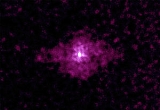
SN 1181
Encyclopedia
First observed between August 4 and August 6, 1181, Chinese and Japanese astronomers recorded the supernova
now known as SN 1181 in eight separate texts.
One of only eight supernovae in the Milky Way
observable with the naked eye in recorded history, it appeared in the constellation Cassiopeia
and was visible in the night sky for about 185 days.
The radio and X-ray pulsar J0205+6449 (also known as 3C 58), which rotates about 15 times per second, is possibly the remnant from this event. If the supernova and pulsar are associated, the star is still rotating about as quickly as it did when it first formed. This is in contrast to the Crab pulsar
, known to be the remnant of the SN 1054
supernova
in the year 1054, which has lost two-thirds of its rotational energy in essentially the same time span. Recent radio surveys of 3C 58, however, indicate that this supernova remnant may be much older and thus not associated with SN 1181.
Supernova
A supernova is a stellar explosion that is more energetic than a nova. It is pronounced with the plural supernovae or supernovas. Supernovae are extremely luminous and cause a burst of radiation that often briefly outshines an entire galaxy, before fading from view over several weeks or months...
now known as SN 1181 in eight separate texts.
One of only eight supernovae in the Milky Way
Milky Way
The Milky Way is the galaxy that contains the Solar System. This name derives from its appearance as a dim un-resolved "milky" glowing band arching across the night sky...
observable with the naked eye in recorded history, it appeared in the constellation Cassiopeia
Cassiopeia (constellation)
Cassiopeia is a constellation in the northern sky, named after the vain queen Cassiopeia in Greek mythology, who boasted about her unrivalled beauty. Cassiopea was one of the 48 constellations listed by the 2nd century Greek astronomer Ptolemy, and it remains one of the 88 modern constellations today...
and was visible in the night sky for about 185 days.
The radio and X-ray pulsar J0205+6449 (also known as 3C 58), which rotates about 15 times per second, is possibly the remnant from this event. If the supernova and pulsar are associated, the star is still rotating about as quickly as it did when it first formed. This is in contrast to the Crab pulsar
Crab Pulsar
The Crab Pulsar is a relatively young neutron star. The star is the central star in the Crab Nebula, a remnant of the supernova SN 1054, which was widely observed on Earth in the year 1054...
, known to be the remnant of the SN 1054
SN 1054
SN 1054 is a supernova that was first observed as a new "star" in the sky on July 4, 1054 AD, hence its name, and that lasted for a period of around two years. The event was recorded in multiple Chinese and Japanese documents and in one document from the Arab world...
supernova
Supernova
A supernova is a stellar explosion that is more energetic than a nova. It is pronounced with the plural supernovae or supernovas. Supernovae are extremely luminous and cause a burst of radiation that often briefly outshines an entire galaxy, before fading from view over several weeks or months...
in the year 1054, which has lost two-thirds of its rotational energy in essentially the same time span. Recent radio surveys of 3C 58, however, indicate that this supernova remnant may be much older and thus not associated with SN 1181.

